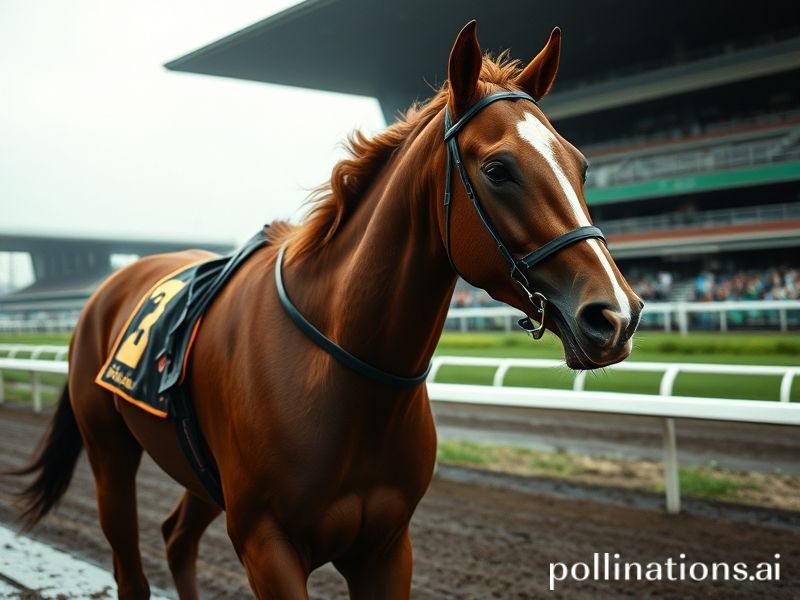Haru Urara: How Japan’s 113-Race Loser Galloped Into Global Hearts and Capitalist Memorabilia
# The Loser That Launched a Thousand Memes: How Japan’s Winless Wonder Became the World’s Favorite Underdog
If you’ve spent any time online this week, you’ve probably seen the clip: a glossy brown racehorse charges down the home stretch, legs pistoning, jockey crouched like a panicked origami crane—only to finish stone-cold last, again. Meet Haru Urara, the Japanese mare who lost 113 consecutive races, never once saw a winner’s circle, and somehow became the planet’s most beloved athlete since the Jamaican bobsled team. Her story is equal parts national therapy session, global meme, and bleak morality tale about a species that cheers for guaranteed failure when the alternative is facing reality.
## A Heroic Dose of Defeat
Haru Urara’s record is so comically bad it loops back around to inspirational: zero wins, 113 losses, lifetime earnings that wouldn’t cover a Tokyo studio apartment for a month. Yet merchandise bearing her likeness—keychains, sake cups, even a Boeing 777 on one domestic route—netted more than ¥10 billion. That’s roughly what the Miami Dolphins paid to actually win a few games last season, proving once more that capitalism can monetize anything except your will to live.
International media lapped it up. BBC called her “the horse that captured a nation’s heart,” CNN dubbed her “a symbol of perseverance,” and Al Jazeera politely ignored the fact Qatar’s own endurance industry prefers winners you can later sell for eight figures. Foreign correspondents flooded Kochi racetrack, filing tear-jerking dispatches about a “miracle loser” giving hope to Japan’s economic underclass. Because nothing screams “recovery from a lost decade” like betting on a guaranteed loser and still losing.
## Soft Power, Hard Hooves
From a geopolitical standpoint, Haru Urara was a godsend. In 2004, when she finally retired, Japan was slipping behind a rising China, its pop-cultural cachet reduced to karaoke machines and battery recalls. Enter a horse so hapless she made the entire country look refreshingly humble. Diplomatic cables (later leaked by someone with too much sake in their system) allegedly show the Foreign Ministry urging “Project Long Face,” pushing feel-good Haru Urara stories to counterbalance the perception of Japan Inc. as joyless efficiency robots.
The soft-power dividend was real: overseas tourism to Kochi Prefecture spiked 30 percent. Visitors snapped photos of the “Haru Urara Shrine,” bought “I survived 113 losses” T-shirts, and left without learning how to pronounce “Kochi.” It was cultural export on the cheap—considerably cheaper, say, than invading Iraq for similar approval ratings.
## Global Underdog-Industrial Complex
But the phenomenon didn’t stay in Japan. Germany’s *Der Spiegel* compared Haru Urara to the Berlin Wall—“an obstacle we keep running into, but by God we run.” In the United States, ESPN packaged her footage for *SportsCenter’s* “Not Top 10,” sandwiched between a quarterback walking into a goalpost and a mascot catching fire. Americans love a loser only slightly less than a winner; combine the two and you’ve got a Netflix docuseries faster than you can say “Tiger King.”
Academics piled on. A 2010 paper in the *Journal of Popular Culture* argued Haru Urara embodied “the Wabi-Sabi of athletic futility,” while British sociologists cited her as proof late-capitalist audiences prefer “safe, non-threatening failure” to genuine triumph—largely because triumph reminds them they’ll never achieve it themselves. Nothing stings like watching someone actually win.
## Existential Moral at the Finish Line
There’s a darker undercurrent, of course. In a sane world, 113 defeats would trigger an intervention: new trainer, new vocation, maybe a quiet pasture somewhere. Instead, Haru Urara kept racing because crowds needed living evidence that persistence without payoff is noble, not tragic. It’s the same logic that fuels lottery tickets, grad school, and Elon Musk’s Twitter feed.
Yet perhaps the global applause makes its own bleak sense. With climate reports reading like suicide notes and wealth inequality ballooning faster than a Bitcoin balance, humanity craves reassurance that losing is still participation, that effort itself has value even when the payoff never materializes. Haru Urara is the patron saint of unpaid internships, of writing novels no one reads, of saving for retirement at 29 and still renting at 59.
So toast the mare who never won. She may not have earned a trophy, but she delivered something more marketable: a collective delusion that trying is enough—preferably while wearing officially licensed merchandise. And if that thought gallops off into the sunset leaving you slightly more depressed, well, welcome to the human race. We’ll see you at the starting gate tomorrow. Same time, same odds.







